It’s pretty obvious that you cannot use certain shots and scenes from movies and television shows if you don’t have the movie owner’s permission. Aside from legal implications, there are other things to consider as well.
With a talent release form template at your disposal, you can easily obtain signed forms that state that actors, actresses, directors, and crew members are authorized to appear in the end result.
Table of Contents
What is a talent release form?

A talent release form is a legal document that can help protect you from personal liability and exposure if you use another person’s image or voice in your work. This type of form must be signed by the talent (the person whose picture or performance is used), not just the talent’s agent or manager. It could be more complex than one page depending on your business and the situation.
A talent release form basically transfers any rights you might have to use the person’s image or voice to the creator of the video, film, podcast, etc. In essence, it means you can’t sue the creator of your content if they use your image or voice in a video without your consent. That’s why talent release forms are also known as “authorization” or “consent” forms.
Talent Release Form Templates
Ensure legal compliance and protect the rights of both talent and creators with our comprehensive collection of Talent Release Form Templates. These customizable and printable templates provide a legally binding framework for obtaining consent from individuals featured in photographs, videos, or other creative works.
Our templates cover essential aspects such as the authorized use of the material, compensation terms, duration of the release, and any additional provisions specific to the project. By utilizing our Talent Release Form Templates, you can secure the necessary permissions, protect against potential liabilities, and ensure that all parties involved are informed and protected. Streamline the talent release process, maintain legal compliance, and establish a solid foundation for creative projects with our user-friendly templates. Download now and confidently manage talent releases in your creative endeavors.
What does the term “talent” mean in a form?
People
This includes children, adults, and also groups of people. You should assume that they know what they need to do if they want to be successful at something (e.g., pose for a photo). It’s your job to make sure they have everything they need before you start recording.
Animals
Again, assume that animals know what they need to do, but many are less likely to be able to communicate with you directly. Be prepared for them to chew on cables or run away from you while recording (or both).
Things
Things include objects such as furniture or plants and places like parks or buildings when used as backdrops for your photos/videos. Make sure these things are safe for your talent (e.g., don’t ask someone to stand on a table without first checking it is stable).
The background
If you are shooting an actor against a greenscreen at home or on set for a commercial, then the background would be considered part of your “talent” because it directly influences how good or bad the final shot looks when finished!
A standard talent or film release form template should cover the following information in order to be legally valid:
- Name of Talent
- Date of birth
- Physical description (height, weight, hair color, and style)
- Photographs, video footage, or audio samples that may be used in your project
- Location(s) where filming will take place (if applicable)
- Type(s) of media that will be used (print, TV, Internet)
Why do I need it?
Using a release form when licensing an image is important because it allows you to exploit your rights separately from the owner’s. For example, suppose you want to use an image on your website but don’t own it outright. In that case, you can license it through Getty Images or another stock photography company and then incorporate that image into your website design with their permission.
When should I use a talent release form?
If you are going to be shooting images in public areas, then you should use one of these forms before taking any photos so as not to infringe on anyone’s rights or break any laws. You may also want to get permission from people who will be featured in your work but are not professional models. This could include friends and family members who are willing to be photographed for free by you and then used within your portfolio or online gallery.
Who needs a talent release form?
Anyone who wants to use photos of people in their artwork, music, or promotional materials must have a talent release form signed by each person they want to use in their work. The artist must obtain signed talent releases from everyone in the photo, whether they’re shown prominently or in the background.
Talent releases aren’t only for media companies and commercial entities; they are also used by individuals who want to use photos of family members on websites, social media pages, or for other personal purposes.
What does a talent release form do?
A talent release form permits someone else to use an image of you without your consent. It allows the artist to use photos in all forms of media, including print, television, film, video, and digital formats such as websites and social media sites. Talent releases also cover commercial advertising uses such as billboard ads or posters with your face on them promoting products such as clothing lines or cosmetics brands.
What is a deal memo for actors?
A deal memo is a document that outlines the terms of an agreement between an actor and a producer. It is different from a contract in that it only covers the logistics of filming, not the terms of compensation.
A deal memo can also be referred to as a ‘deal sheet’ or ‘casting sheet.’
It includes information such as:
Whether the actor will be paid or not (if they are being paid, how much they will be paid), if they are being paid, this amount should be calculated according to their rate per day/hour/week/month (or whatever is appropriate). The amount should also include any overtime hours.
Where and when filming will take place. This could include flight information for international shoots.
Who else will be involved in the shoot (i.e., other stars or directors), along with their role and experience level? This helps ensure that everyone involved has an understanding of what they are getting themselves into.
Other release forms related to a talent release form
Film notice
This form informs people that they may appear in a movie, television show, or commercial. It gives them the right to refuse to be filmed and identifies who to contact if they do not want to be filmed. The film notice should be posted in prominent locations on the set where all crew members and performers will see it.
Minor release form
If your film contains scenes with minors (anyone under 18 years old), you will need this form signed by their parents or guardians. The minor release should be kept with your other forms until after filming has ended when you can send it off to legal for processing for use as evidence in case of a lawsuit down the road.
Location release form
Suppose your film includes scenes shot at someone else’s property, business, or event space (such as a wedding). In that case, you will need a location release signed by the property owner who agrees to let you shoot there, along with permission to use any footage in your finished project (if desired). You should have one person on your team designated as “property coordinator” for this purpose; that person should meet with owners.
FAQs
What should a talent release form include?
A talent release form should include the participant’s name and contact information, the project details, permission for recording/photography, allowed media usages, any compensation, a liability waiver, and signatures of the participant and producer. The date and location should also be included.
How do you make a talent release form?
To make a talent release form, research any state laws and customs for releases. Then list fields for names, project details, usage rights, disclaimers, and signatures. Format it professionally with logo. Have a lawyer review it if needed. Provide copies for participants to sign at shoots.
How do I create a release form?
To create a release form, outline the content fields needed like names, project details, usage rights granted, disclaimers, signatures, and dates. Format it as a standard agreement. Ensure legal requirements in your state are met. Have a lawyer review it. Save as a reusable template.
What are two forms that a talent release can take?
Two common forms talent releases take are:
- A short, concise one-page form covering basic permissions.
- A more extensive, contract-style agreement detailing usages, compensation, regulations, etc.
The release can be customized based on the production, location, and distribution.
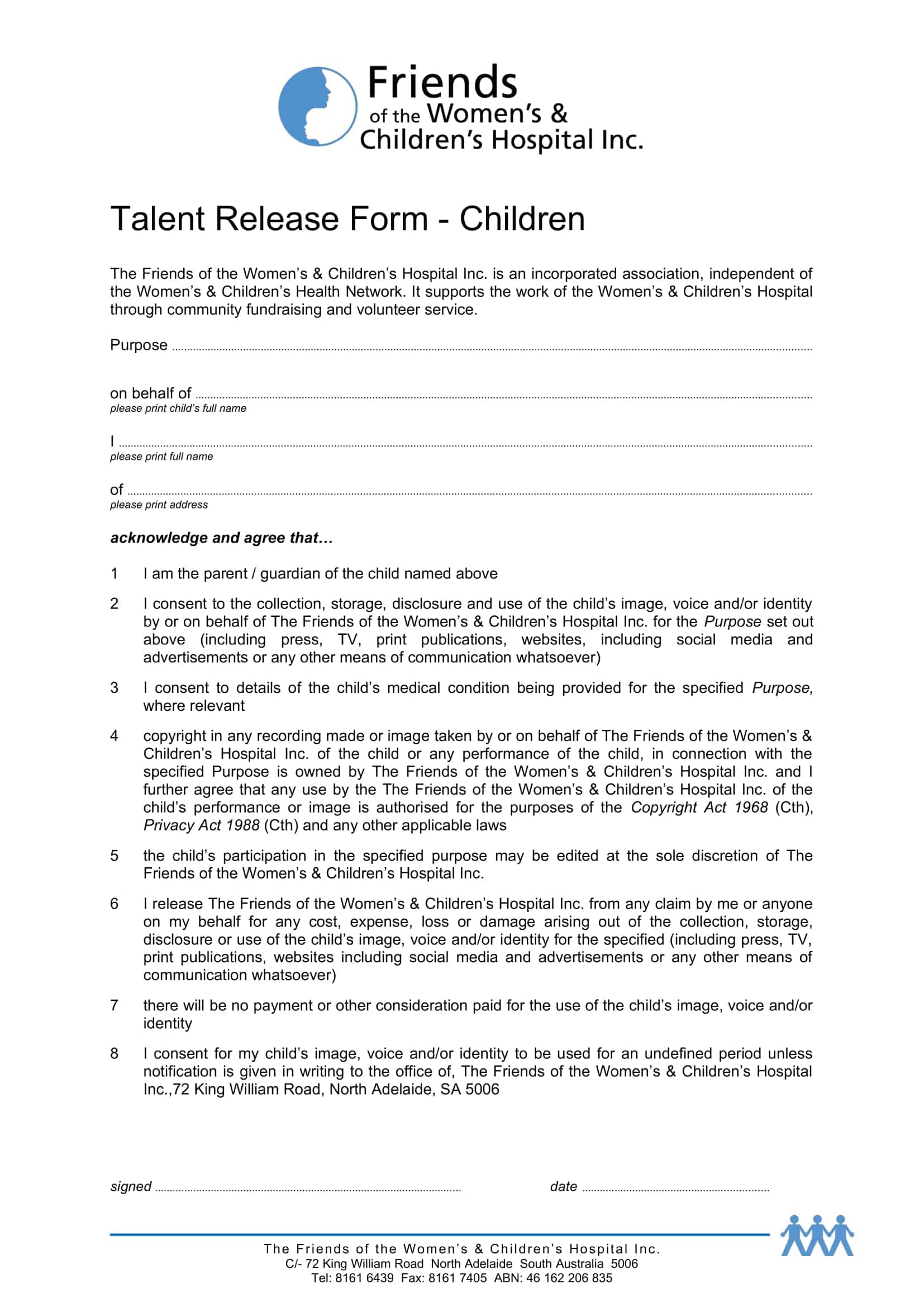

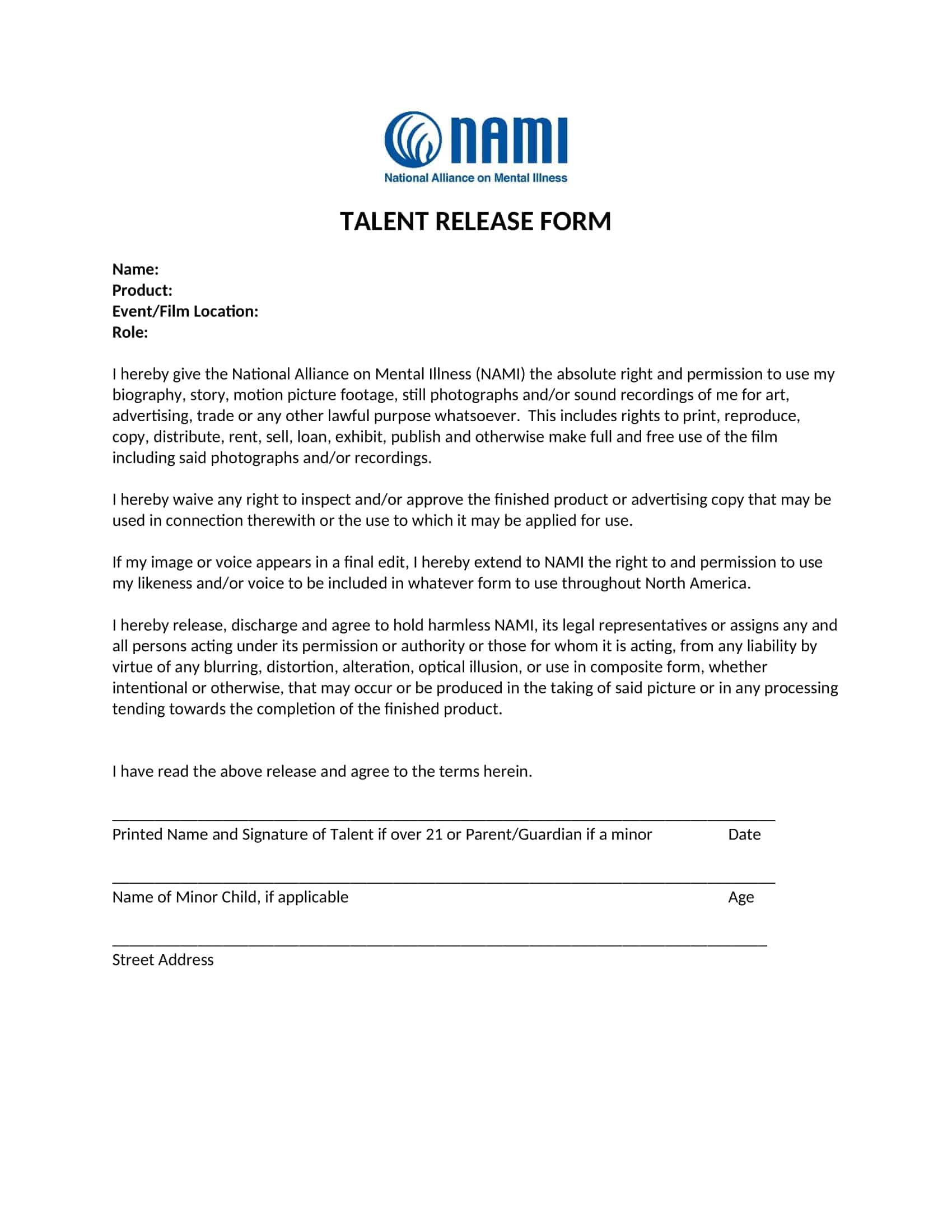

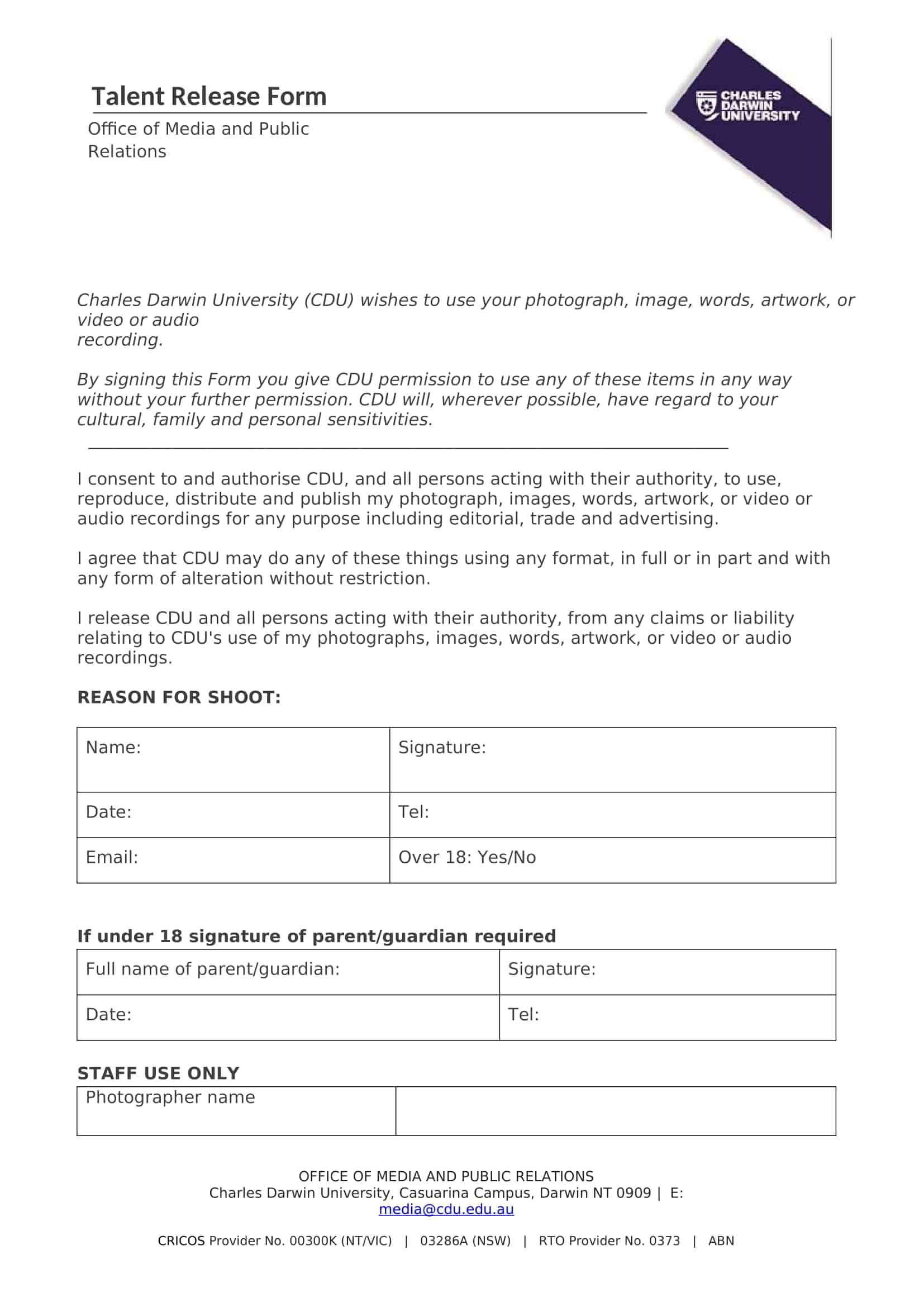






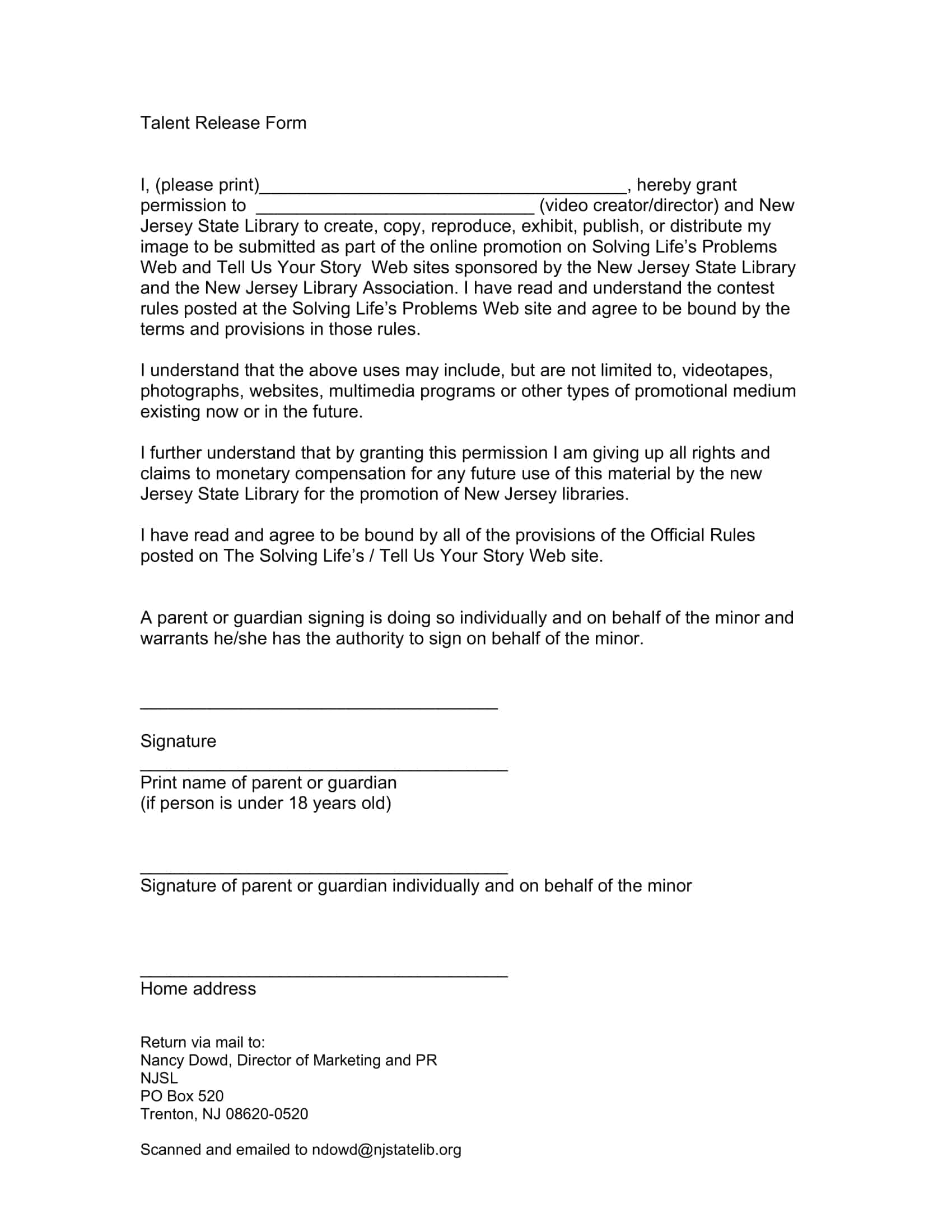
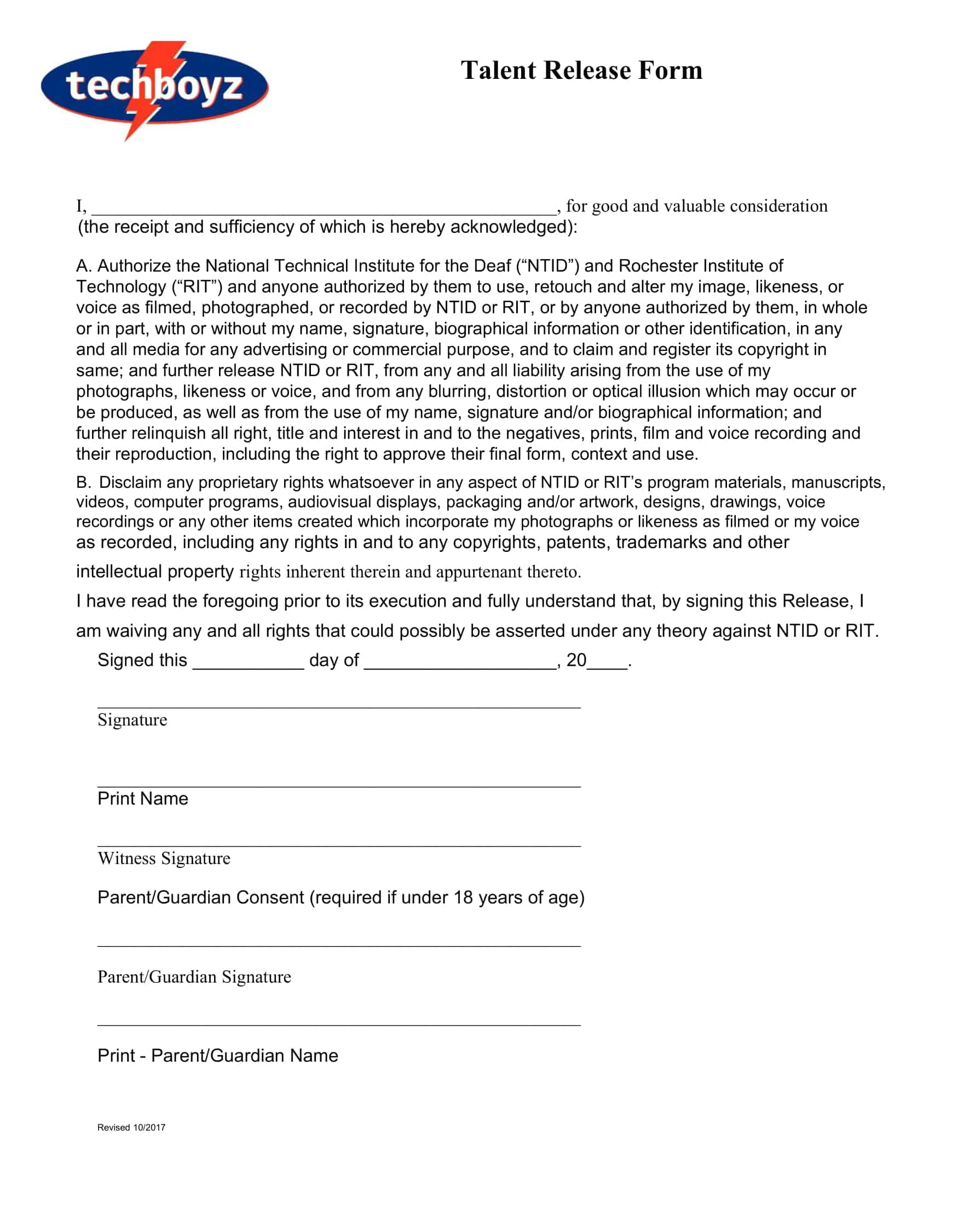








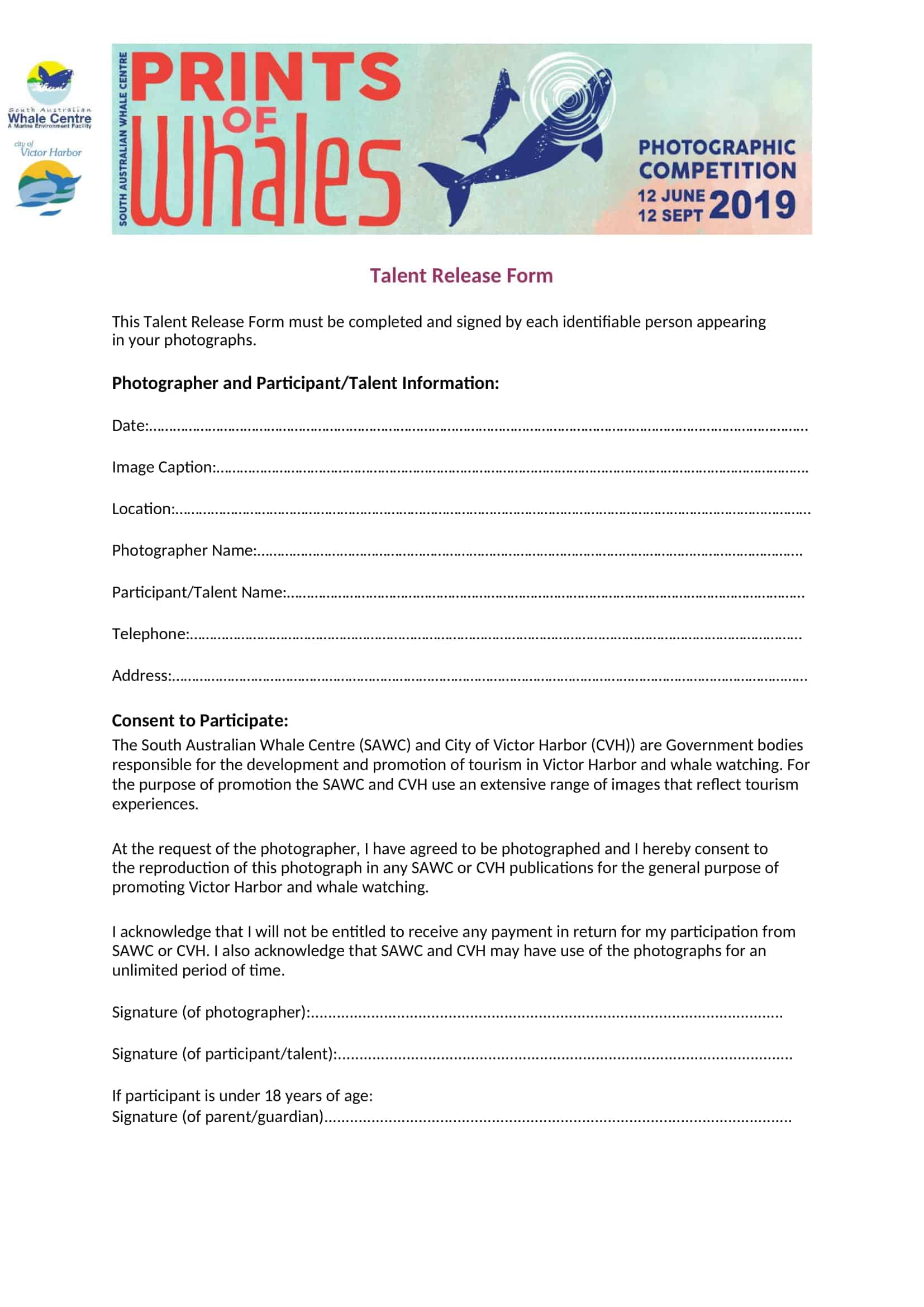


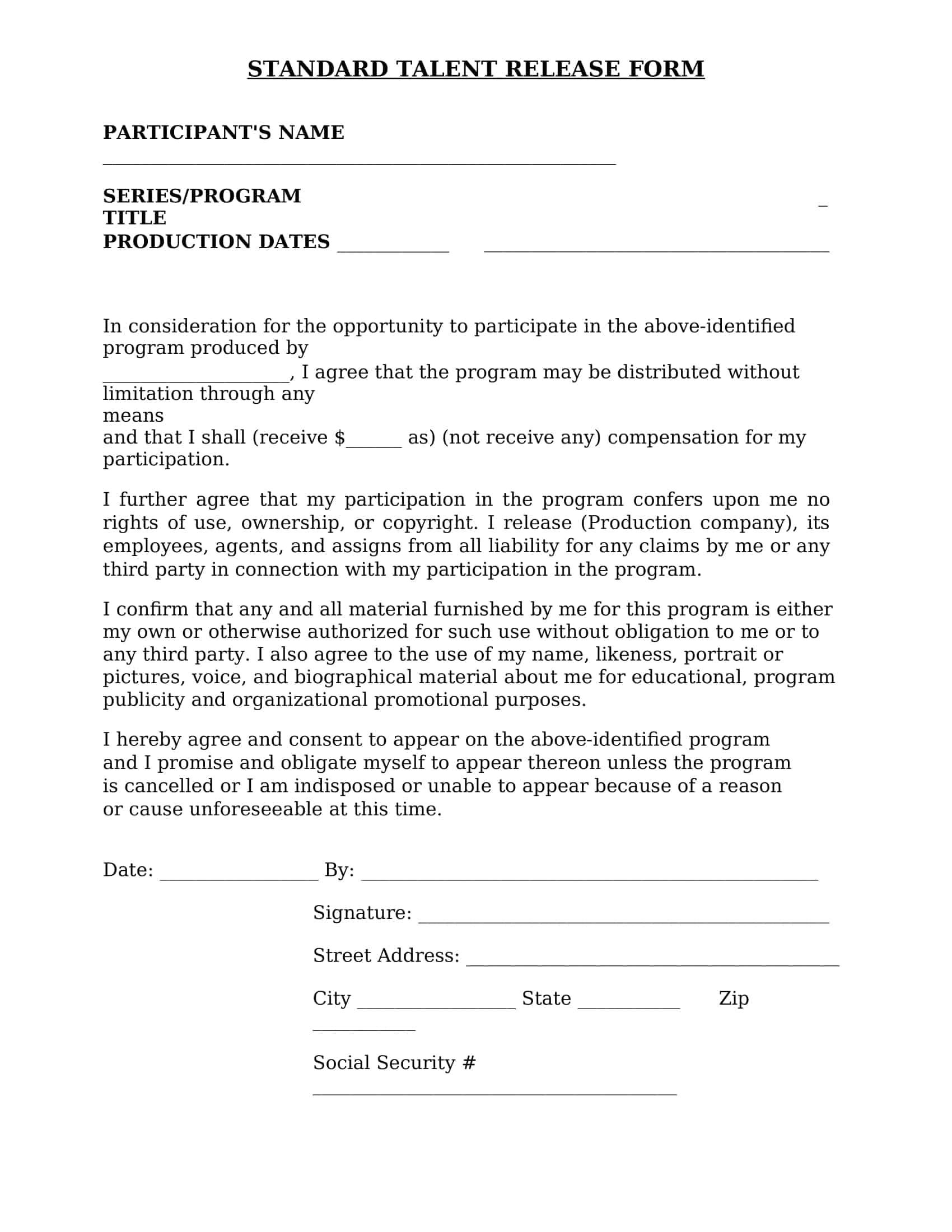


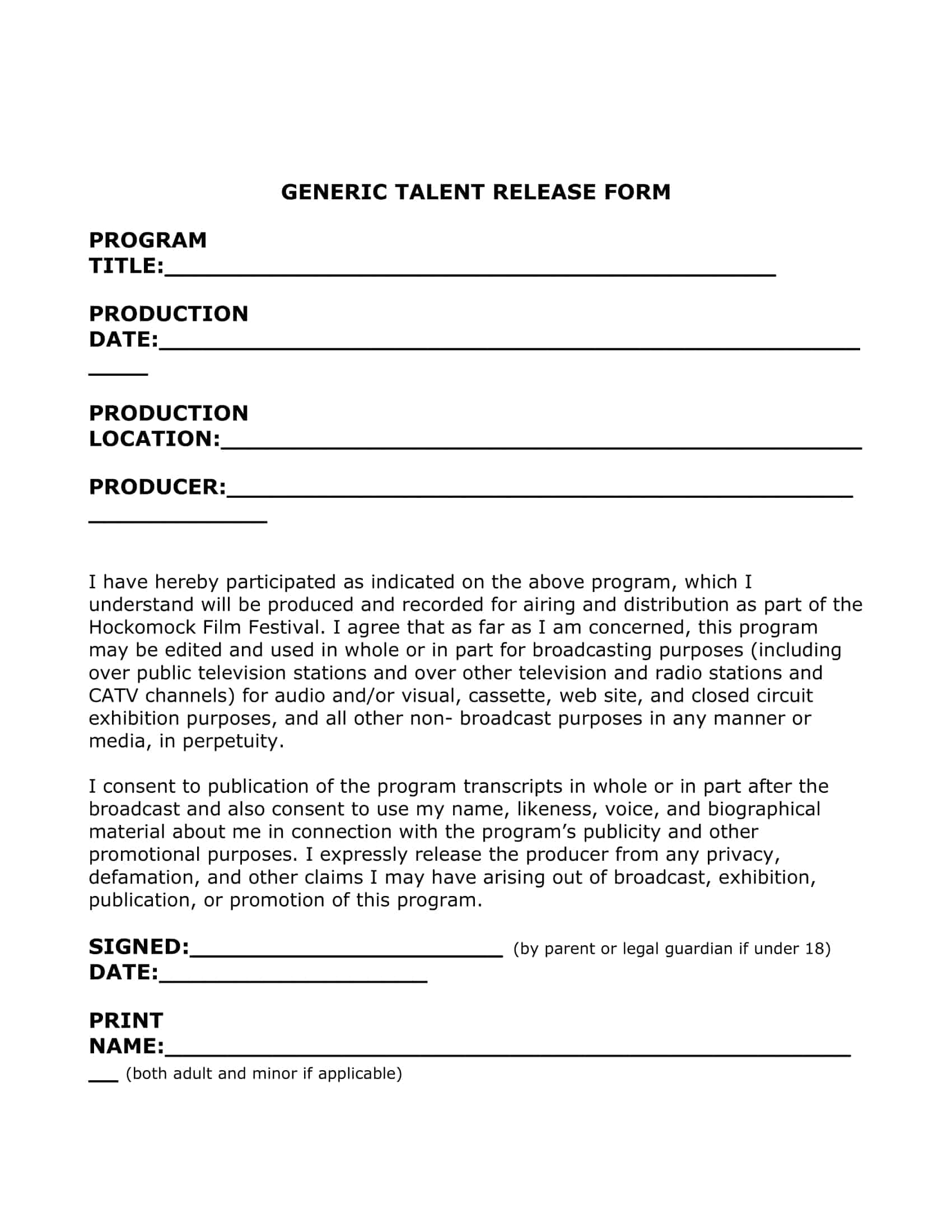












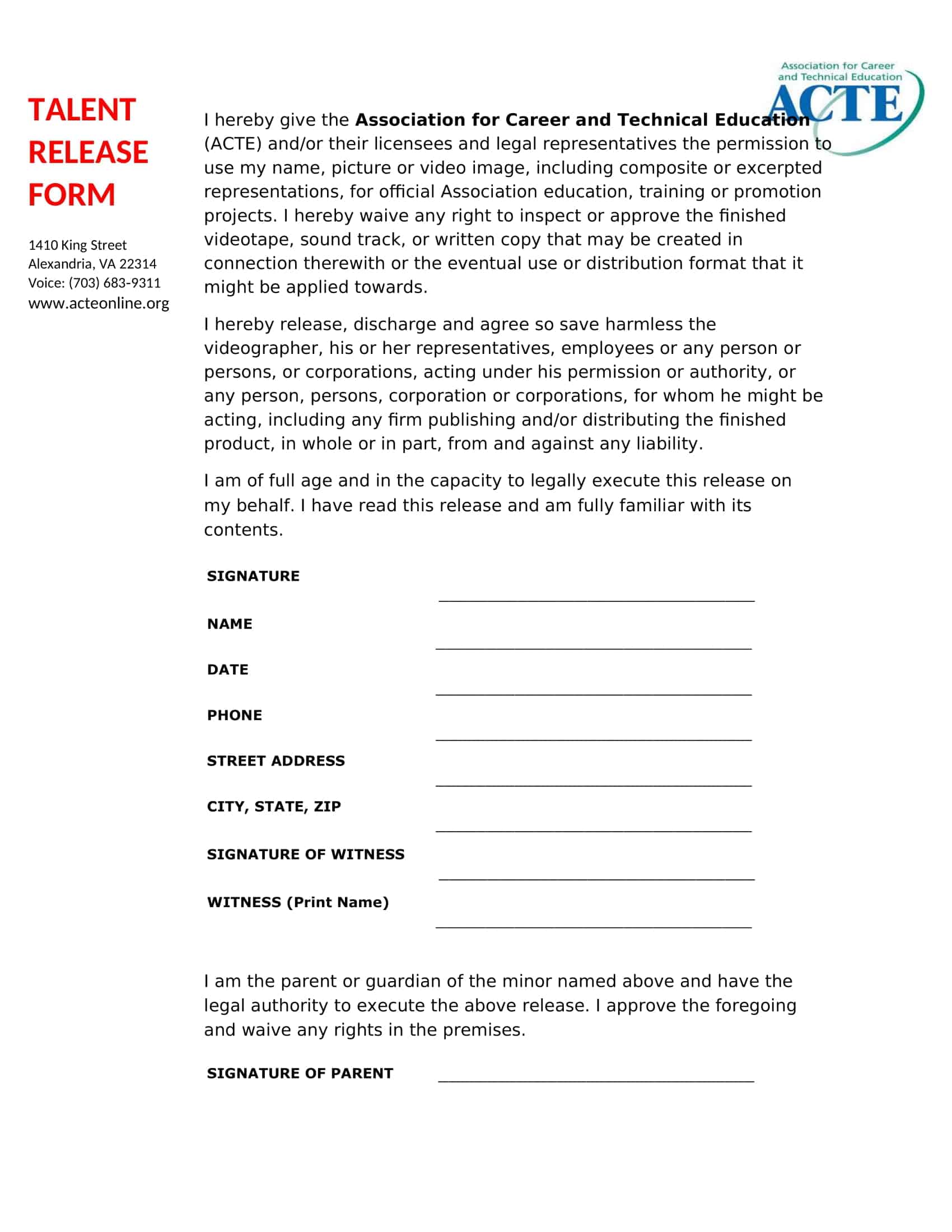
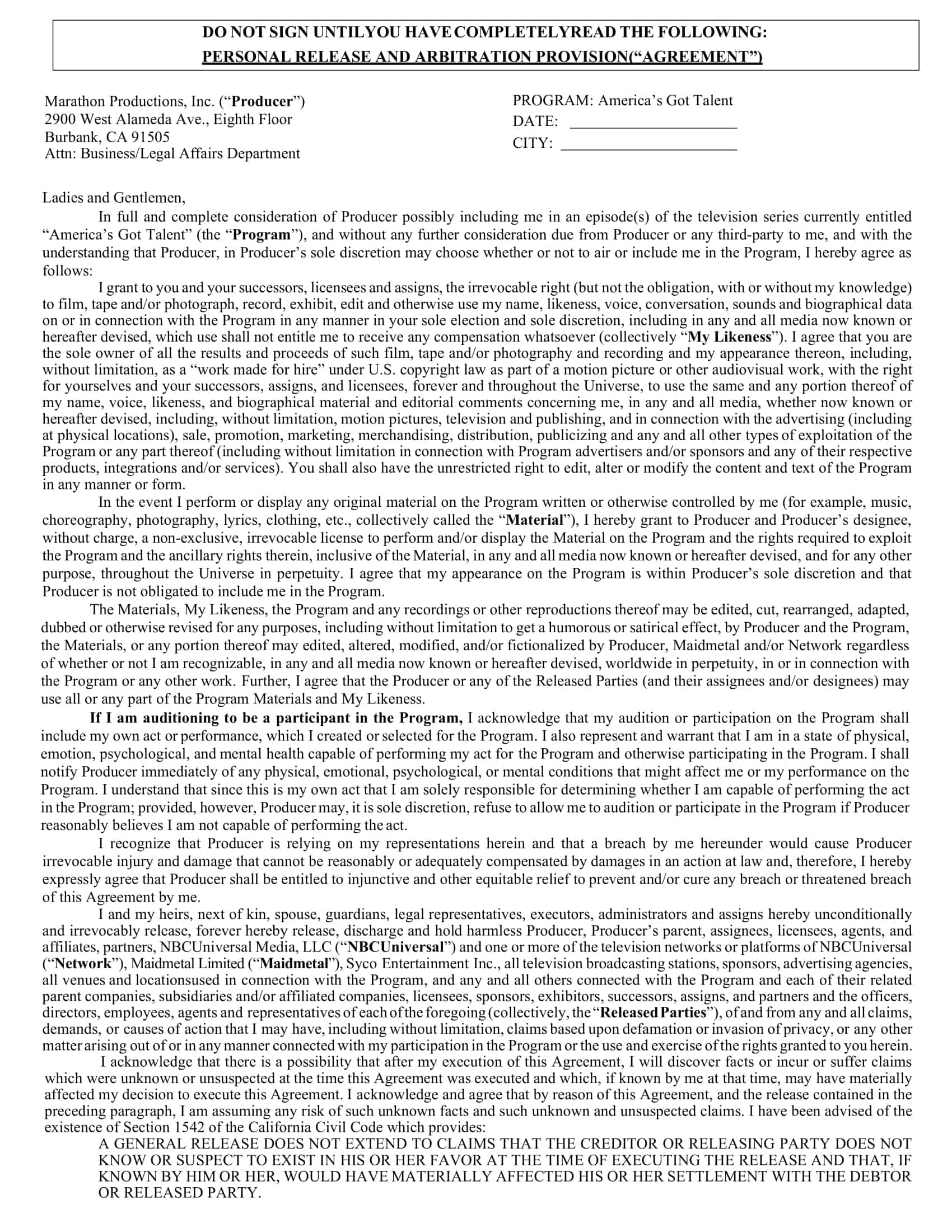


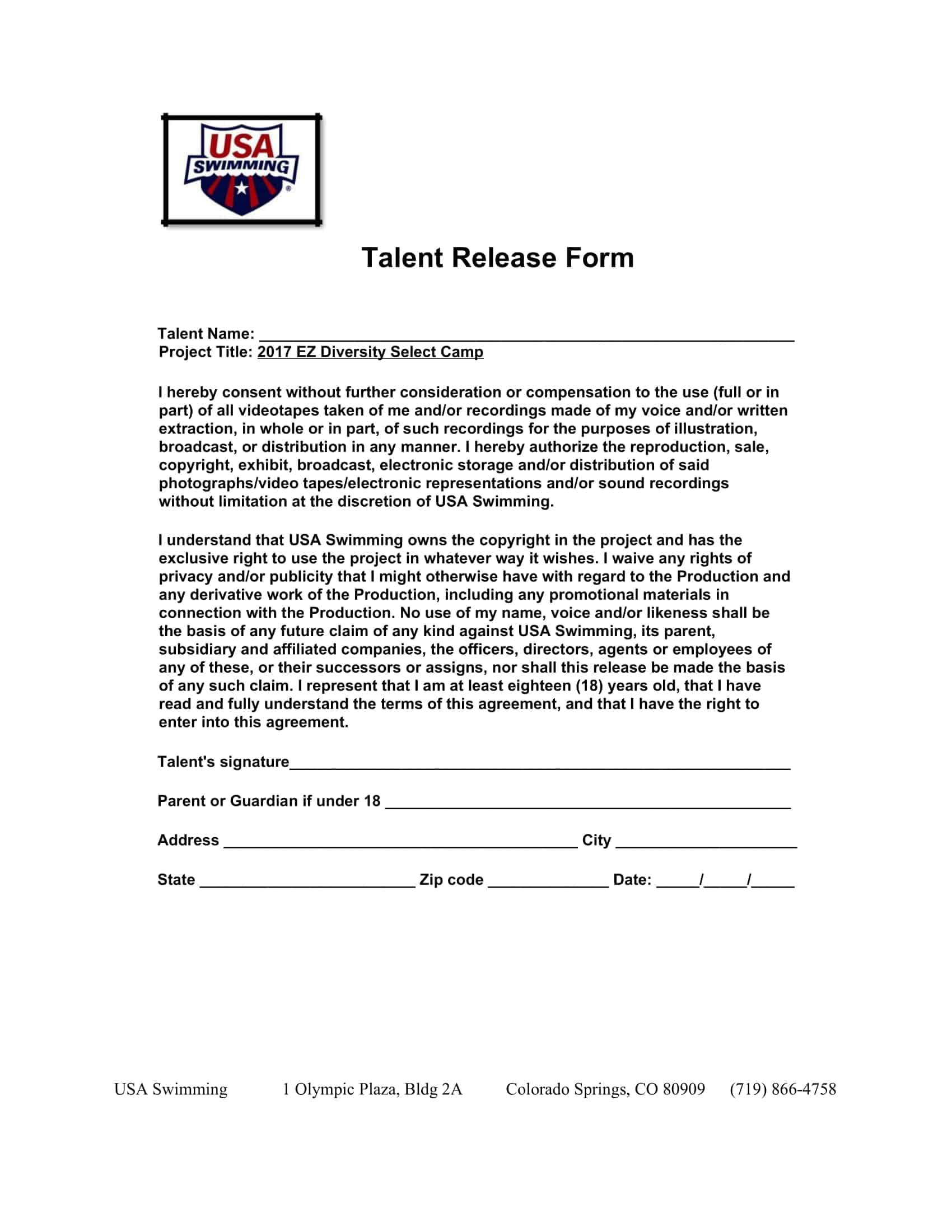
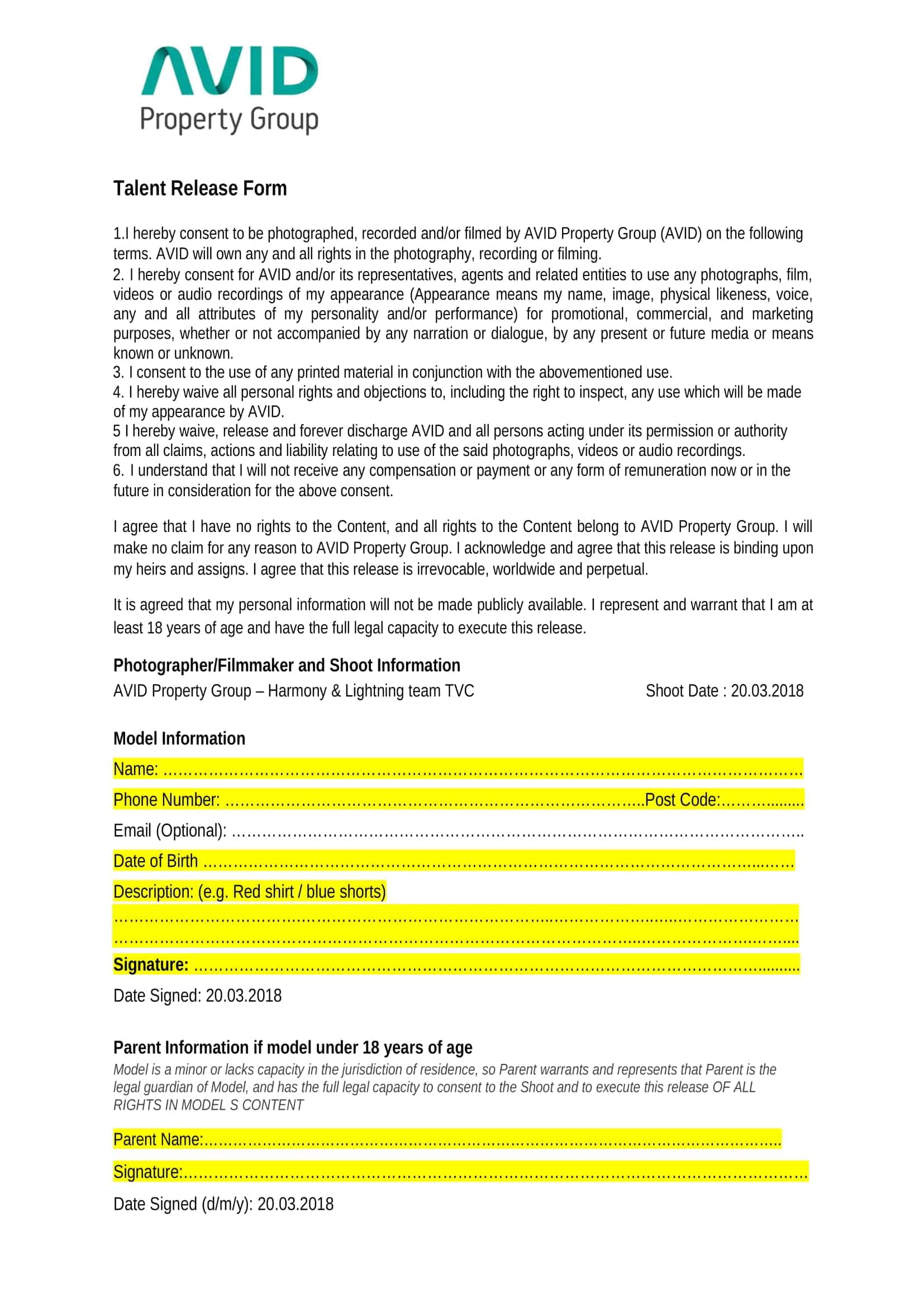
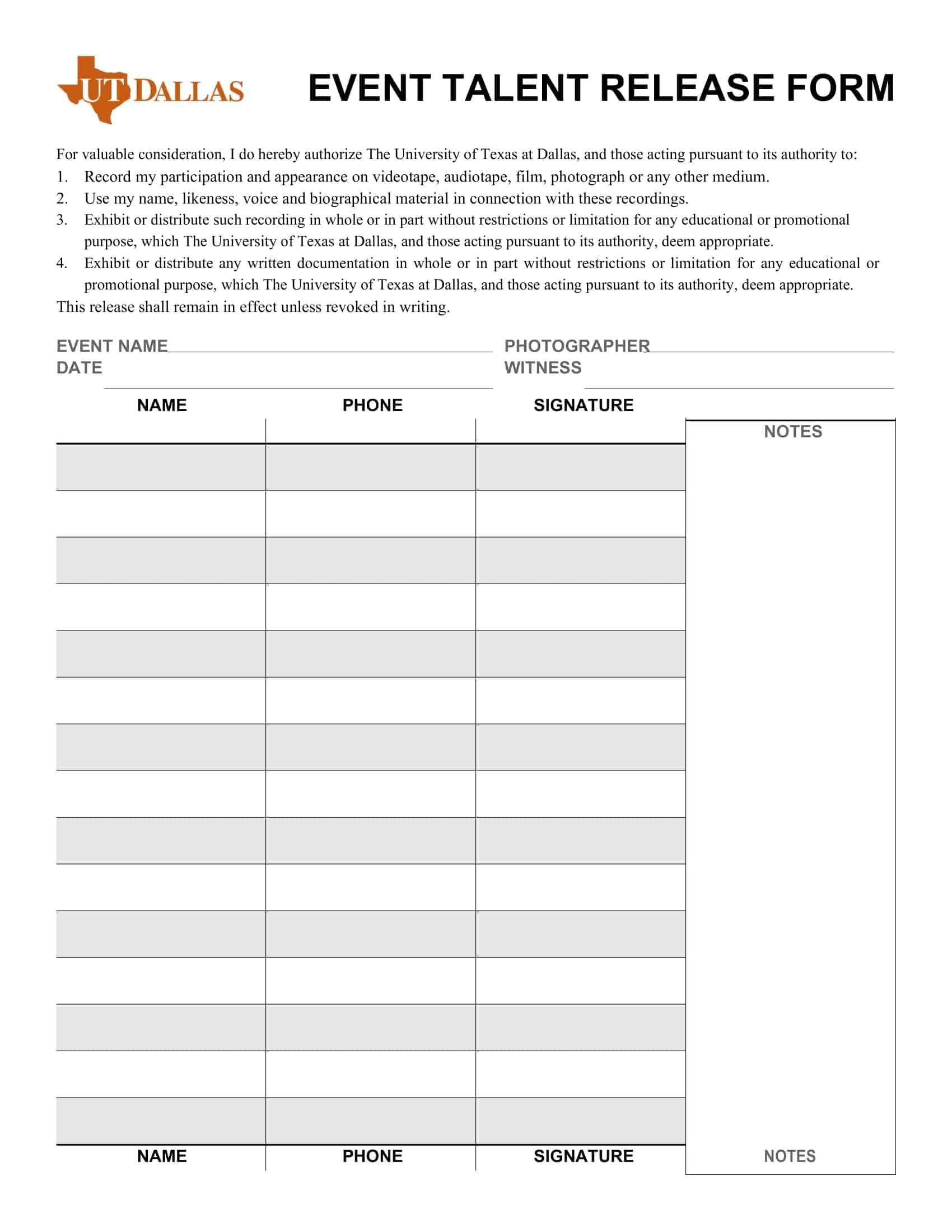
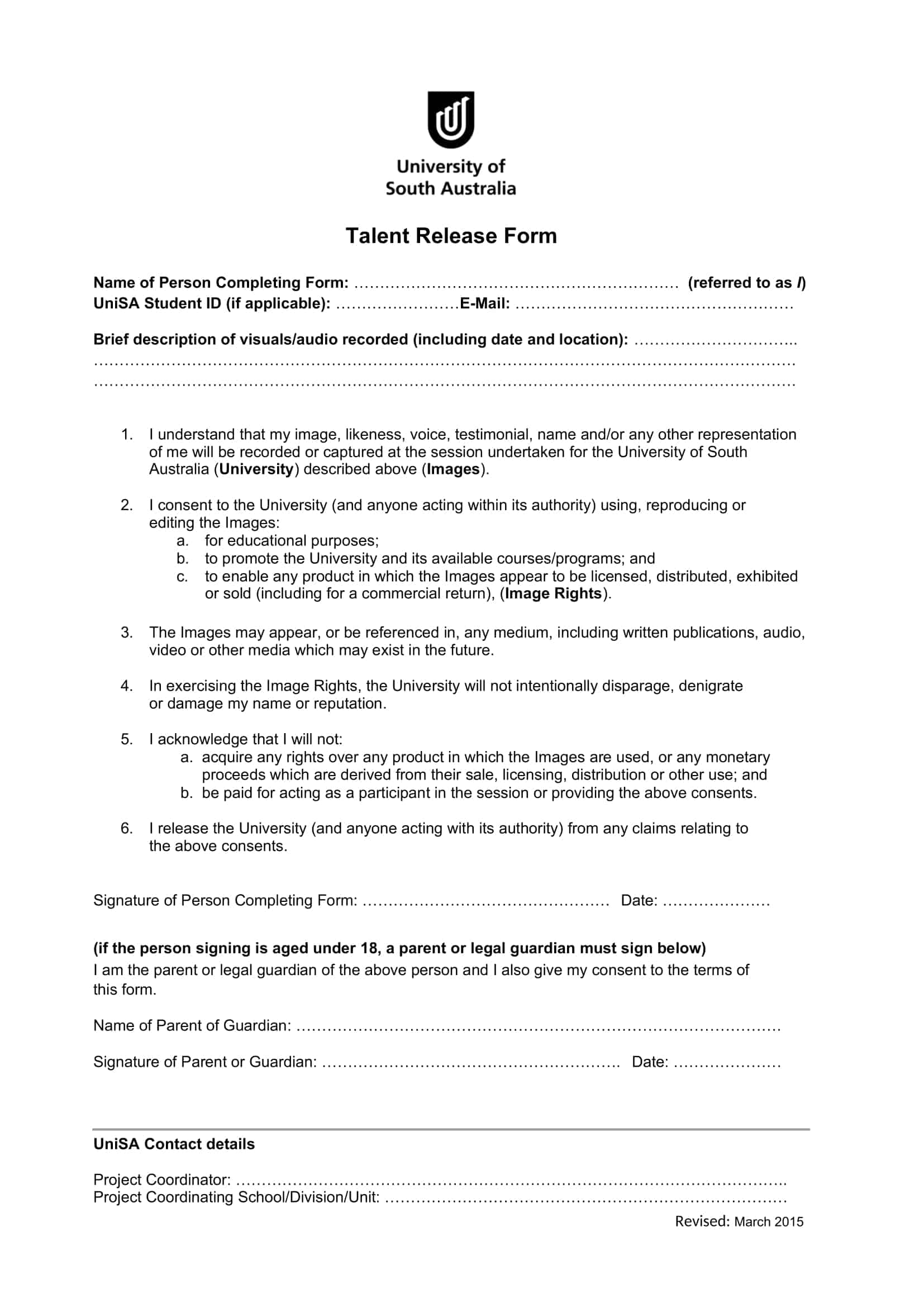
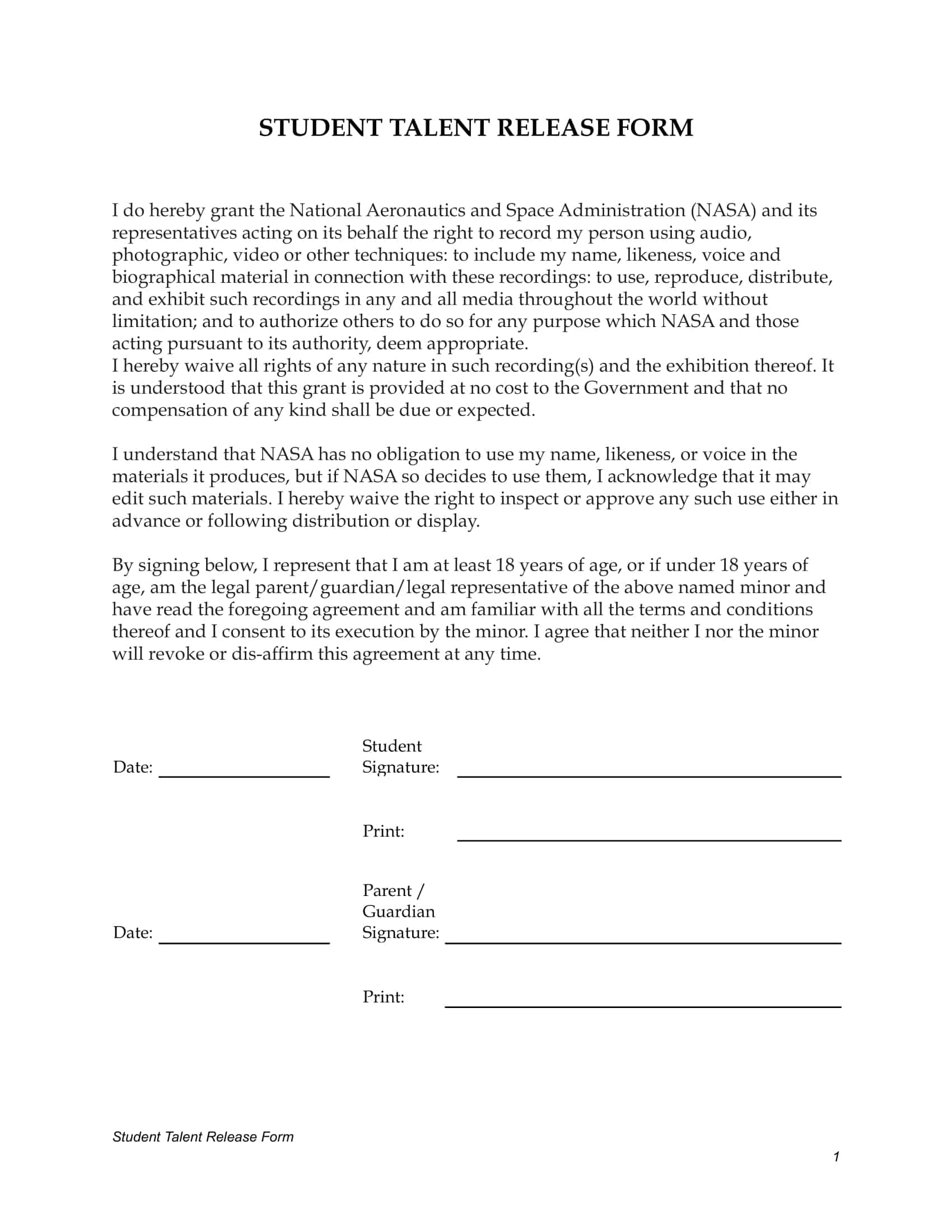
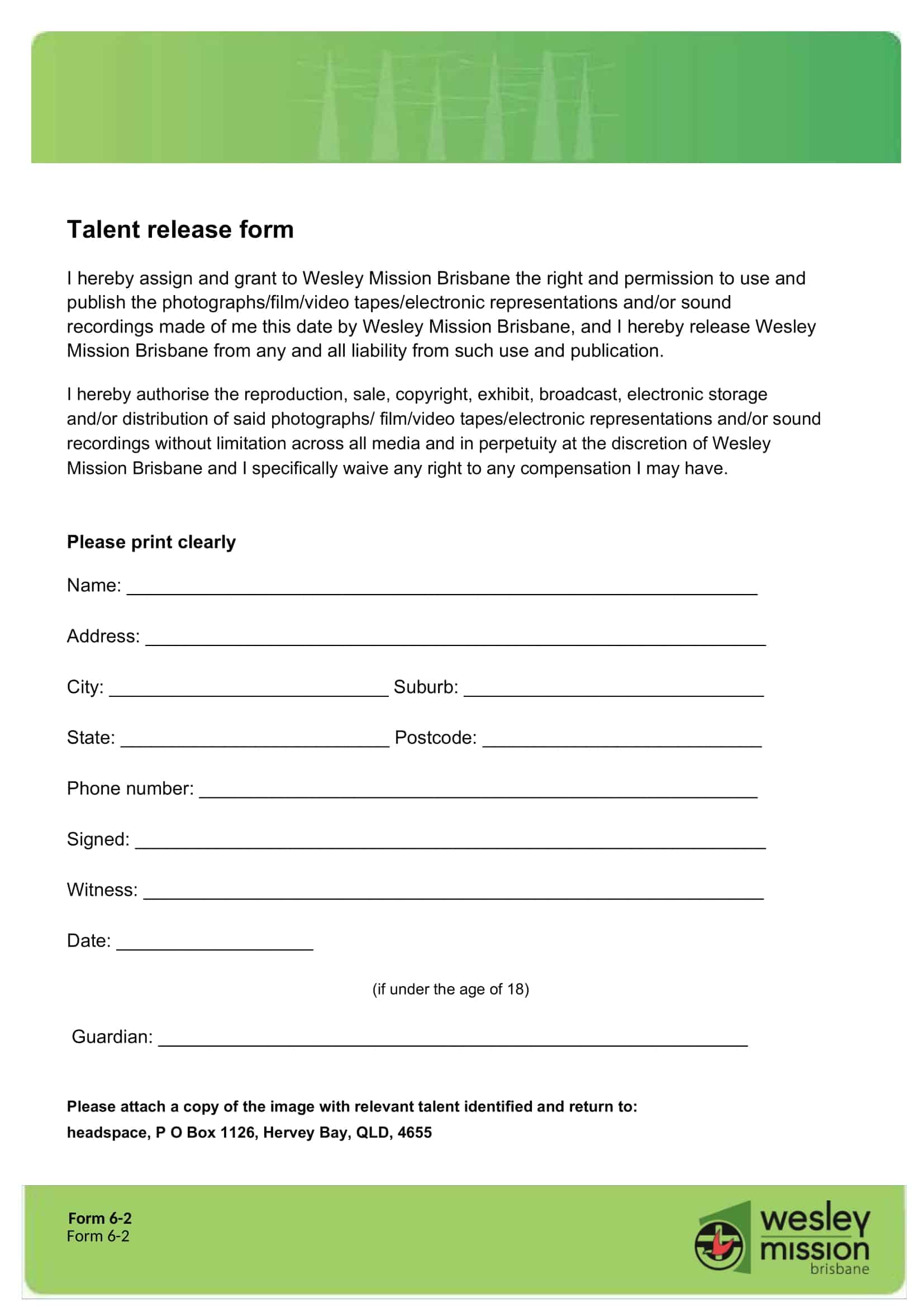
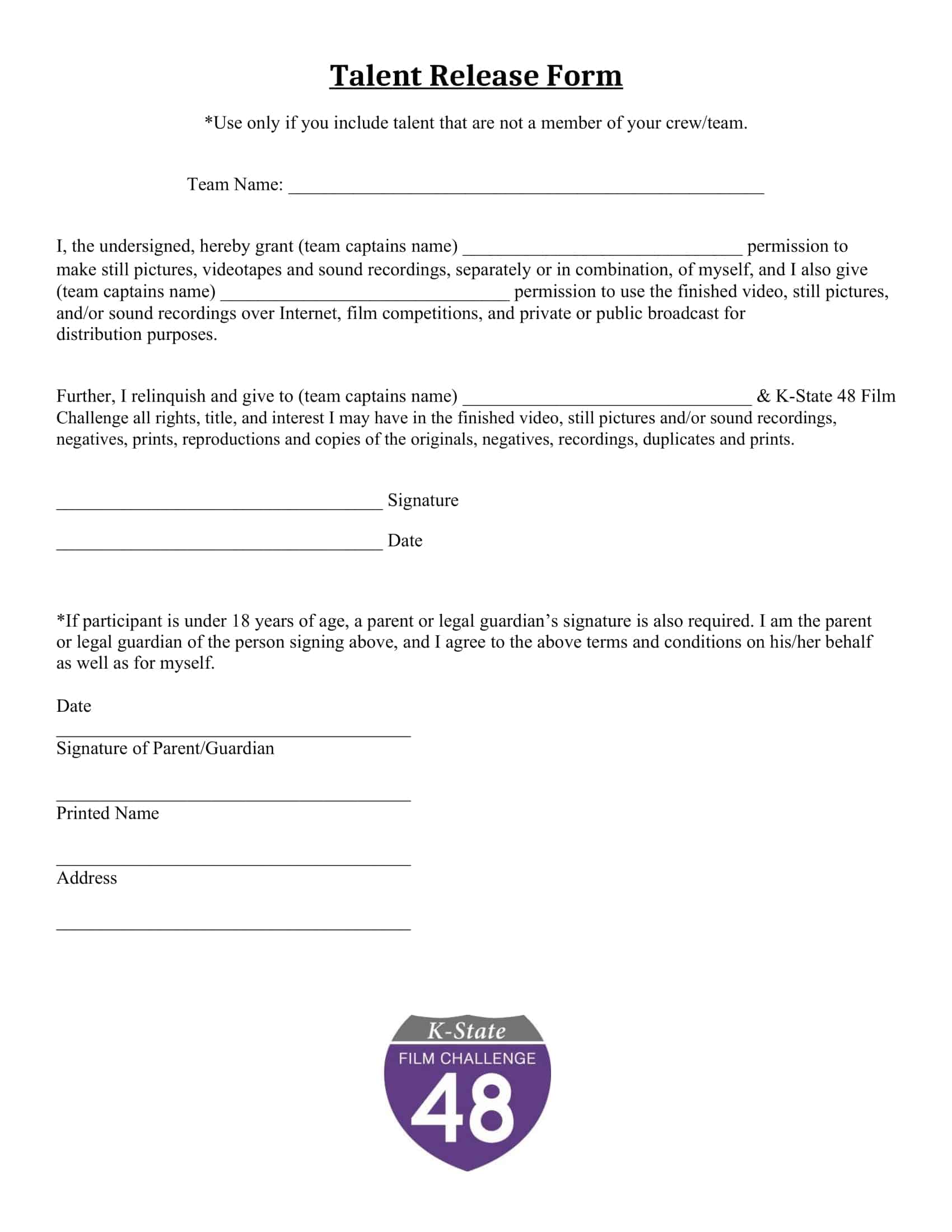
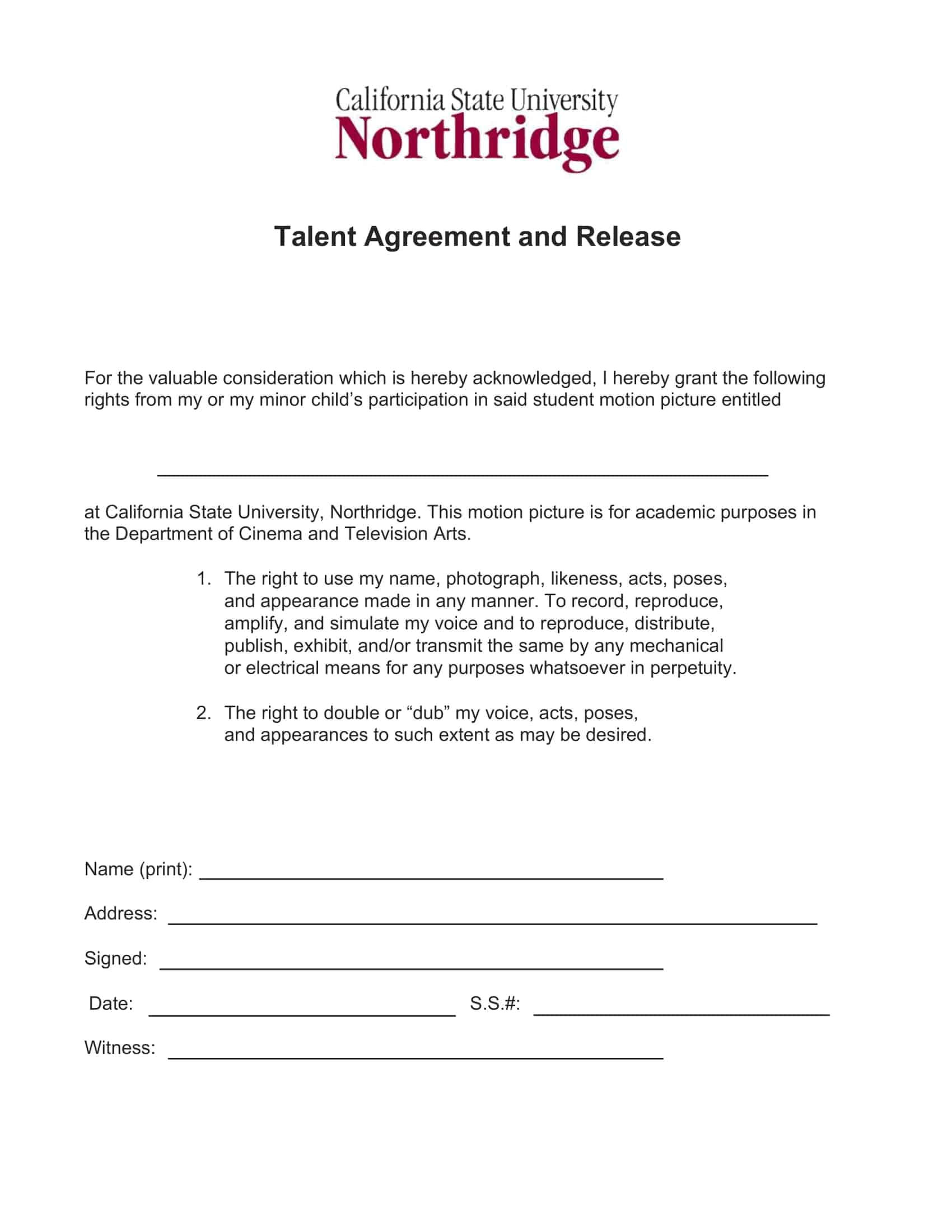
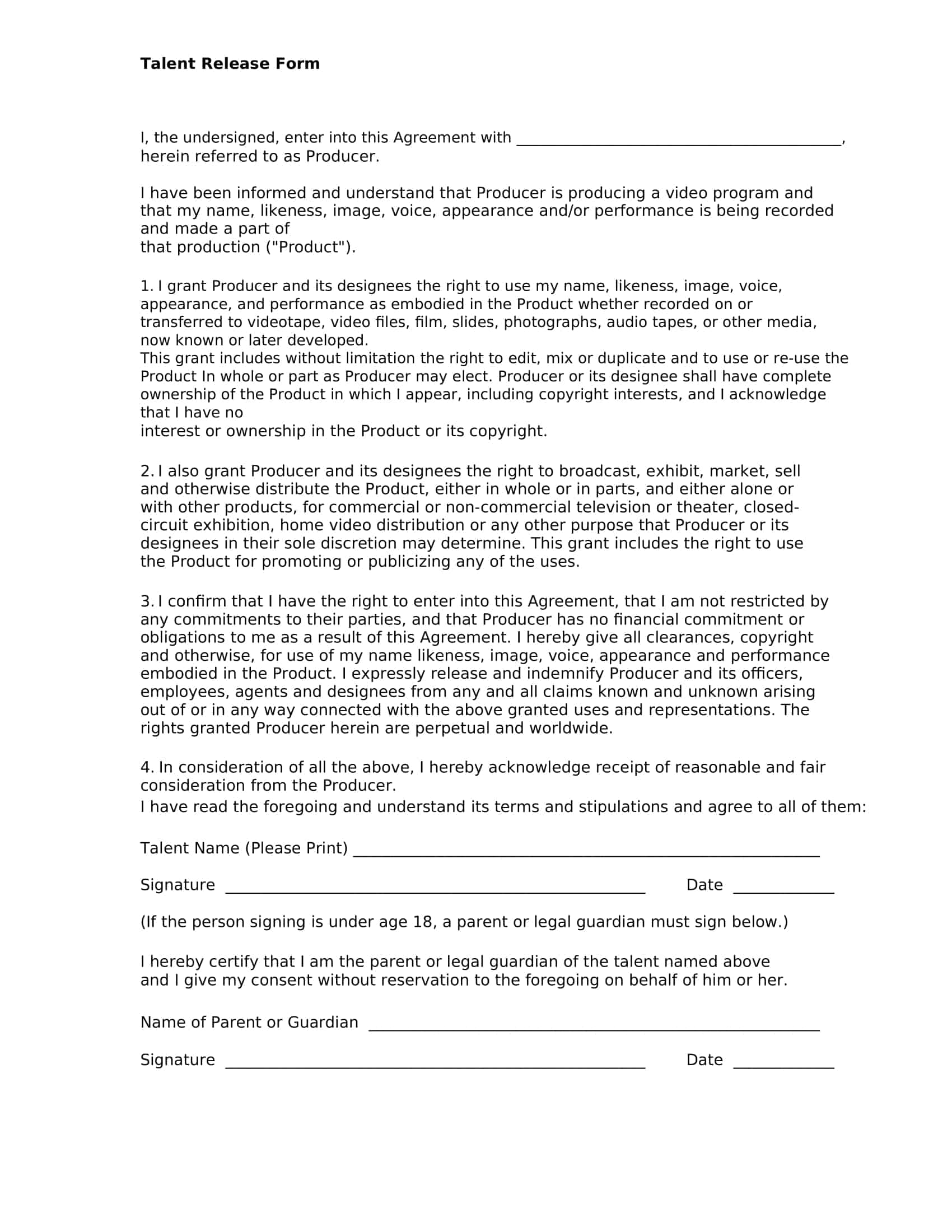
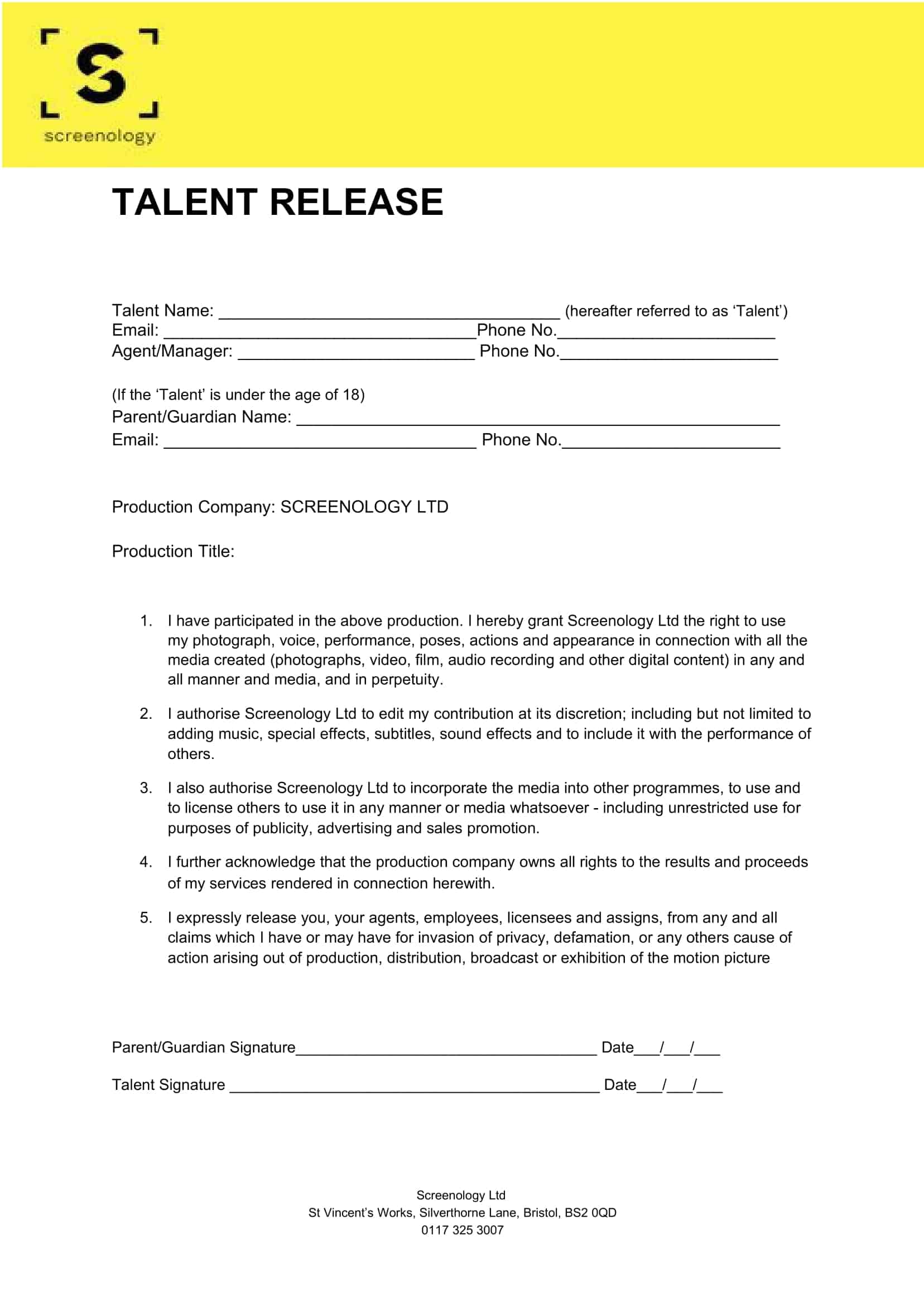
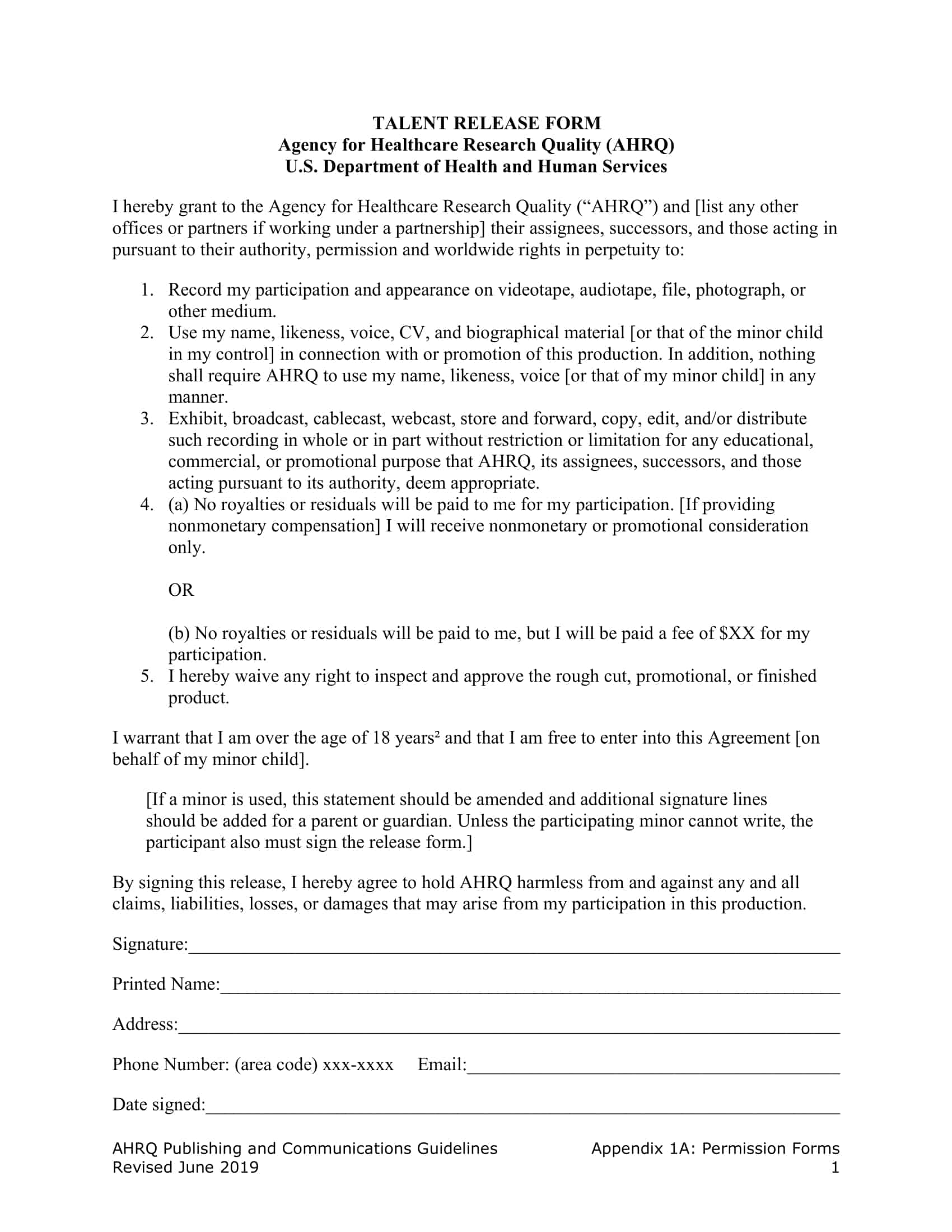
![Free Printable Location Release Form Templates [PDF, Word] Property / Example 1 Location Release Form](https://www.typecalendar.com/wp-content/uploads/2023/05/Location-Release-Form-1-150x150.jpg)
![Free Printable Roommate Agreement Templates [Word, PDF] 2 Roommate Agreement](https://www.typecalendar.com/wp-content/uploads/2023/06/Roommate-Agreement-150x150.jpg)
![Free Printable Credit Card Authorization Form Templates [PDF, Word, Excel] 3 Credit Card Authorization Form](https://www.typecalendar.com/wp-content/uploads/2023/06/Credit-Card-Authorization-Form-150x150.jpg)
